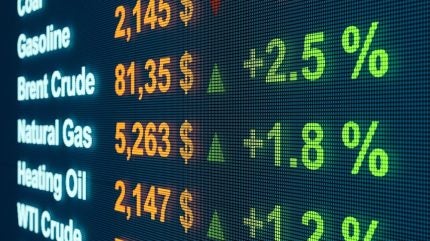
The war in Ukraine has led to the largest commodity price shock since the 1973 oil crisis, according to a new World Bank report, elevating prices for years to come. Energy prices rose 448% in the year to March, while prices for food and fertiliser rose by 84% and 222%, respectively.
Russia’s invasion of Ukraine in February has exacerbated pre-existing tensions in global supply chains. Energy and non-energy commodity prices had already risen by 81% and 33%, respectively, between 2020 and 2021, owing to the global economy’s strained recovery from Covid-19.
Before the war, the World Bank had expected 2022 to be a year of stabilisation, with energy prices rising just 2% and non-energy commodity prices falling by 2%. Now, the organisation expects energy prices to increase by 51% over the course of this year, along with a 19% increase for other commodities. Prices for all major commodity groups bar timber and precious metals are expected to remain above pre-war forecasts until at least 2024.
Vast increases in energy prices
Energy prices have seen particularly significant increases owing to Russia’s status as a major exporter of oil and gas. Brent crude oil is now expected to average $100 per barrel in 2022, a year-on-year increase of 42%, while European natural gas prices are set to double, leaving them ten times higher than they were in 2020. By 2024, prices are expected to remain 31% above pre-war forecasts.
Fertiliser prices are expected to see the most sustained inflation with prices in 2024 remaining 82% above the World Bank’s October 2021 forecasts. Fertiliser producers have been hit hard by the rise in price of natural gas, which serves as a key input, as well as an export ban by Russia, the world’s largest fertiliser exporter. Prices had been expected to rise by just 6% this year, but are now set for an increase of 69%.
Inflation in fertiliser markets is likely to feed into consumer food prices in the years to come, a result of both higher input costs and reduced yields. Yields are already set to be lower than previously forecast this year given the importance of Russia and Ukraine to global grain markets.

US Tariffs are shifting - will you react or anticipate?
Don’t let policy changes catch you off guard. Stay proactive with real-time data and expert analysis.
By GlobalDataBefore the war, the World Bank had expected food prices to decrease by 2% in 2022. Now, prices are set to rise by 23%. As with energy markets, the impact is likely to be felt for years to come – food prices in 2024 are now expected to be 15% higher than the World Bank had forecast in October 2021.
Indermit Gill, the World Bank’s vice-president for equitable growth, said that the shock to prices was being “aggravated” by a surge in export restrictions as countries have sought to secure their own supplies of key commodities.
Egypt, Ghana, Indonesia, Russia, Serbia, Turkey and Ukraine have all imposed export bans since the war began. Indonesia has banned exports of palm oil (equivalent to 52% of global exports in 2020), while Russia has banned exports of wheat (10% of global exports) and barley (12%). Indian officials are reportedly considering a ban on cotton exports.
“These developments have started to raise the spectre of stagflation,” said Gill. “Policymakers should take every opportunity to increase economic growth at home and avoid actions that will bring harm to the global economy.”



